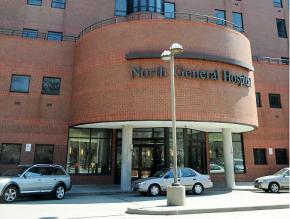Doors close on a Harlem hospital
reports on the closing of another hospital in New York City--and explains why workers are protesting that they were misled.
HARLEM WORKERS and residents have been hit with yet another blow in the ongoing assault on living standards for working New Yorkers. The 200-bed North General Hospital in Harlem, which filed for bankruptcy on July 2, is the latest in a series of New York City hospital closings.
The closing means that 1,000 employees, most of them Harlem residents--including 900 members of 1199SEIU, the big health care workers union--have lost their jobs. Health care services for the community will deteriorate further, as other area hospitals are forced to bear additional burdens--such as 36,000 more emergency room admissions per year--with no additional resources.
The New York City political establishment--including Gov. David Paterson; New York City Mayor Michael Bloomberg; Rep. Charles Rangel; Calvin Butts, the chairman of the board of trustees at North General and longtime pastor of Abyssinian Baptist Church; and North General President Samuel J. Daniel--engineered the closing behind closed doors. They then took steps to minimize protest.

First, employees were given only four days' notice of the closure, even though the board of trustees decided on the move a week earlier and the plan had obviously been in the works for weeks before the bankruptcy. In the week before the announcement, Daniel assured union members that he was unaware of any plans to close the hospital.
Second, a public relations campaign downplayed the closing and assured Harlem that its health care needs would be addressed. The New York Beacon, a weekly newspaper in Harlem, trumpeted the bankruptcy deal as having "saved" the hospital. Rangel and Butts assured the community that health care in Harlem was only getting better--an assurance belied by the fact that Butts stated under oath to the bankruptcy court that the hospital "has been vital to providing the residents of Harlem with the health services they critically require."
Mayor Bloomberg similarly brushed off any concerns about increased emergency loads at other medical facilities, saying, "These things do have a habit of sort of working themselves out." But workers at other hospitals--which have had to pick up the slack not just from North General, but other recently closed city hospitals--say the situation in emergency rooms has been chaotic and overwhelming.
Butts also assured North General workers that they would be able to find jobs elsewhere, including the new Institute for Family Health (IFH), a clinic taking over the building. These assurances have proved similarly hollow--the new IFH has so far employed fewer than 10 of the 900 union members dismissed at North General.
ON JULY 26, hundreds of people packed the auditorium at Harlem Hospital for a health care forum--among the panelists were Rangel and IFH President Neal Calman.
The panelists gave no specifics about how health care in Harlem would improve despite the closing. Instead, they offered nothing but praise for Barack Obama's health care reform law--Rangel, in particular, was eager to take credit for pushing the legislation through the House--and vague promises of better service.
The forum was interrupted, however, by a large group of angry ex-employees of North General. During the question-and-answer session, they shouted, chanted and protested their treatment by North General, particularly castigating Calman for reneging on promises to hire North General workers at the new IFH clinic.
1199SEIU has filed a grievance against IFH for violating the law by bringing in Office and Professional Employees International Union Local 153 to represent workers making lower wages.
North General workers are still picketing the site, and the union is requesting that residents not use IFH until the grievance is resolved. But workers have little recourse--the SEIU's grievance about the IFH, even if successful, involves no more than 100 jobs. The rest of the North General building is being used to move nursing home patients from Roosevelt Island.
Perhaps the most outrageous fact in all this is that a New York state authority--the Dormitory Authority of the State of New York (DASNY)--controlled whether North General Hospital would stay open or not, because it holds most of the hospital's debt.
North General's bankruptcy papers show a total debt of $293 million and assets of $67 million. DASNY's share of that debt is $190 million. According to Butts' affidavit in bankruptcy court, North General hadn't obtained a waiver from DASNY for its breach of certain parts of the loan.
While all this was going on with North General, the 286-bed Harlem Hospital is also under increasing pressure. According to reports, Harlem's neurology and rehabilitation medicine departments are closing soon, the hospital's 50-year partnership with Columbia is ending, and doctors are being laid off in large numbers.
Indeed, the entire hospital system in New York City is under increasing pressure to reduce its overall deficit $762 million--which amounts to just over 5 percent investment bank Goldman Sachs's net profits in 2009.


